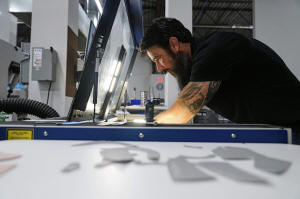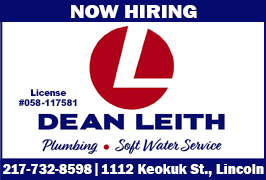Innovation takes a backseat at small companies as tariffs become a
full-time preoccupation
[June 12, 2025] By
ANNE D'INNOCENZIO
NEW YORK (AP) — Toy robots that teach children to code. Sneakers made in
America. Mold-resistant kitchen gadgets.
The three items are among new products that have gotten stuck in the
pipeline due to President Donald Trump's unpredictable trade policies,
according to the brand founders behind the stalled items. They say that
instead of fostering U.S. innovation, Trump’s tariffs are stifling it
with extra costs and unexpected work.
At Learning Resources in Vernon Hills, Illinois, Made Plus in Annapolis,
Maryland, and Dorai Home in Salt Lake City, research and development
have taken a backseat to recalculating budgets, negotiating with vendors
and tracking shipments in the shifting tariff environment.
“If we don’t have enough cash to cover just the restocks of the things
that we know we need, do we want to take a risk on this new thing when
we don’t know how well it will sell yet?” Dorai Home founder Kelsey
O’Callaghan said.
O’Callaghan started the eco-friendly home goods company with a stone
bath mat and now offers about 50 kitchen and bathroom accessories, which
are made in China with a non-toxic material that dries quickly. New
launches are critical to increasing sales and attracting customers, she
said.
As Trump increased the tariff on Chinese goods to 20% and as high as
145% before reducing the import tax rate to 30% for 90 days, Dorai Home
postponed introducing new merchandise. O'Callaghan said she had to lay
off the CEO as well as the head of product development, who helped the
company jump on new trends.
“I haven’t really put the time or the emphasis on (innovation) because
I’m covering too many other people’s roles,” she said.

The company paused shipments from China in early April but resumed some
on a staggered basis after the president's rate reduction. On Wednesday,
Trump touted progress in U.S.-China trade talks.
With details still sketchy and a deal not finalized, entrepreneurs
interviewed by The Associated Press said they viewed the tariffs war as
an ongoing threat.
Tariffs and American innovation
The potential stunting of innovation follows an economic slowdown during
the coronavirus pandemic, when companies also had to put projects on
hold. Some experts think the on-again-off again tariffs may have more
enduring consequences because they rewire markets and upend business
strategies.
“When executive attention shifts from innovation to regulatory
compliance, the innovation pipeline suffers. Companies end up optimizing
for the political landscape rather than technological advancement,”
economists J. Bradford Jensen, a nonresident senior fellow at the
Peterson Institute for International Economics, and Scott J. Wallsten,
president of the Technology Policy Institute think tank, wrote in an
April blog post.
Trump has argued that curtailing foreign imports with tariffs would help
revive the nation's diminished manufacturing base. Analysts and various
trade groups have warned that fractured trade ties and supply chains may
depress R&D activity of U.S. tech and health care companies that rely on
international partnerships or foreign suppliers.
Small companies, which often drive the innovations that create jobs and
economic growth, already are under strain.
With fewer people on staff and tighter budgets compared to large
corporations, entrepreneurs say they are spending more time on cutting
costs, suspending or arranging orders, and deciding how much of their
tariff-related costs to charge customers. That means they’re spending
less time thinking of their next big ideas.
Schylling Inc., a Massachusetts company that produces modern versions of
Lava lamps, Sea-Monkeys, My Little Pony and other nostalgic toys, has
its products made in China. As part of its strategy to account for
tariffs, the company put a group of employees on temporary unpaid leave
last month to reduce expenses.
Marketing director Beth Muehlenkamp said she and other furloughed
workers typically would have been planning products for the final months
of 2026. But Schylling isn't focusing on designing new products given
the unstable trade outlook.

[to top of second column] |

Craig Simile, senior operations manager at Made Plus, prepares
materials with a laser cutting machine at the company's
manufacturing facility in Annapolis, Md., Tuesday, June 10, 2025.
(AP Photo/Stephanie Scarbrough)
 “It’s really hard to focus on
innovation and creativity when you’re consumed with this day-to-day
of how we’re just going to balance the books and deal with the
changing rates,” Muehlenkamp said.
An uneven product pipeline
Even some companies that do their manufacturing in the U.S. are
scaling back investments in new products. Made Plus, a Maryland
company that makes athletic shoes at a small factory in the state
capital, put a planned golf line on hold because two key components
— a foam insole and the tread for the bottom of the shoe — currently
are made in China, founder Alan Guyan said.
The company customizes its shoes on demand and charges $145 to $200
a pair. The footwear is made from recycled plastic bottles with
advanced knitting, 3D printing and computerized stitching
techniques. It's looking into getting components from Vietnam
instead of China.
Embracing new technology is essential to restoring manufacturing
capability in the U.S. and competing with Asia, Guyan said. But
given ongoing trade frictions, he said he does not want to invest
time or money evaluating the latest embroidery and knitting
machines, which come from Germany, Italy, China and the U.S.
“We’re just battening down the hatches a little bit and just hoping
that there’s enough influence in the community of footwear that it
will somewhat change and get resolved and we can move forward,” he
said of the tariff roller coaster.
In contrast, many big companies are forging on. Google parent
Alphabet confirmed late last month that it still planned to spend
$75 billion on capital expenditures this year, with most of the
money going toward artificial intelligence technology.
What's next for R&D?
Sonia Lapinsky, a managing director at consulting firm AlixPartners,
has advised her clients to limit tariff discussions to a small group
of executives and to keep their product creation cycles in motion.
Businesses have an even greater imperative to come up with
attention-grabbing innovations when consumers may be reluctant to
open their wallets, she said.
Yet smaller companies may struggle to wall off tariff discussions
from the rest of the business.

Learning Resources CEO Rick Woldenberg said that roughly 25% to 30%
of the 350 employees at the educational toy company’s headquarters,
including product developers, are working at least part-time on
tariff-related tasks.
The company usually develops 250 different products a year and
expects to get half that many off the drawing board for 2026,
Woldenberg said. While exploring factories in countries besides
China, he said, Learning Resources is delaying the next generation
of its interactive robots that help children develop computer
programming skills through games and other activities.
The family-run business and Woldenberg's other toy business,
hand2Mind, are locked in a legal battle with the Trump
administration. The jointly owned companies filed a lawsuit accusing
the president of exceeding his authority by invoking an emergency
powers law to impose tariffs.
A federal judge ruled in favor of the two companies last month, and
the administration has appealed the decision. Woldenberg said he's
ready to take the case to the U.S. Supreme Court.
“It's a win at the Supreme Court that we need,” he said. “And so
until then, there will be no certainty. Even then, if the government
is bound and determined to keep us in an uncertain situation,
they’ll be able to do that.”
All contents © copyright 2025 Associated Press. All rights reserved |